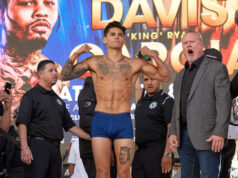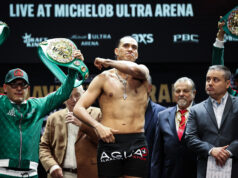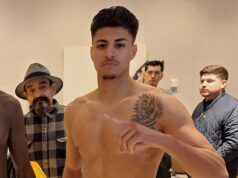There are some differences between writing for a boxing website like this one and writing for a sports website with a boxing page, like, say, CBSSports.com. The largest difference is the catering you do within the large chasm between an aficionado’s knowledge of our sport and a casual fan’s primary interests: violence, controversy, redemption. When you write about prizefighting for the casual fan, in other words, you often have to traffic in clichés.
The sole reason to do it, then, is for greater compensation; boxing aficionados are an ever-dwindling number of men, while casual sports fans are, apparently, a growing contingent in America. The obvious drawback is that if you have 1,000 words to work with, and 300 go towards who your subjects are and why a reader should care, there isn’t very much room left for new ideas.
Finally, this is a challenge any television series that chooses boxing as its subject will encounter. FX Network’s “Lights Out” – whose series finale happens Tuesday at 10 p.m. ET – did a passable job of it. “Lights Out” won’t have a second season, because its ratings weren’t robust, but don’t use that to infer failure.
Another sentence or two about boxing writing. The pursuit of greater compensation, anymore, is a fool’s errand. There was a time when the creation of boxing websites seduced entrepreneurially minded folks, but those days have passed. You’d have a better chance of finding an American prospect in the heavyweight division, today, than a boxing writer who’s had a pay raise since 2008.
That is why – whether your expertise lies in the throwing of hands or the crafting of sentences – a boxing writer should write for aficionados wherever he can find them. Let posterity do with that what she will.
Such a quixotic stance is not possible for a television show. It must cross-over all sorts of competing lines. It must entice folks with seemingly nothing but age and gender in common. The peril of trying to be lots of things to lots of people is that you ultimately must combine a faithful replication of your subject with the need to deliver what others – often more opinionated than serious – already expect. That sort of maneuvering leaves you little space for transcendence.
“Lights Out” has been entertaining. It has been true to our sport. Its acting has been for the most part very good. But it has also wanted for transcendent moments. To employ a fully inapt analogy, if “Lights Out” were a figure skater, it would do very well in the compulsories but leave its judges unaffected after the free-skating program.
“Lights Out” came with a number of interesting extras. Its web presence on FXNetworks.com is well-built. The mini episode “Split Decision” answers questions its episodes ask. The show came with the usual boxing stuff – fatherly trainer, prodigal younger brother, self-sacrificing wife. But it also had a refreshing cast of daughters.
Still, there was always the steep hill of a white American heavyweight champion in the year 2005 to climb. You assume this casting choice was about mainstream marketability – even while thinking you’re dirty for suggesting it.
The program’s two most intriguing performances, though, came from black actors, only one of whom is American, and neither of whom is featured on the official cast page. Reg E. Cathey, the American of the duo, played Barry K. Word, a Don King-inspired hustler who is different from other partial interpretations of King for being slighter of stature and somewhat effeminate.
Cathey’s performance as a fight promoter brings pleasant surprises. You cannot overplay King – he is too famous, too much a self-caricature, and in every way too large. Cathey’s interpretation, then, is enjoyable for its subtlety and slyness. This is also what distinguishes the acting of Holt McCallany, who plays the title character, Patrick “Lights” Leary. More about McCallany in a bit.
The largest thrill of “Lights Out,” though, was the performance of British actor Eamonn Walker, who played a disturbed, fragile trainer named Ed Romeo. Walker appeared in only two episodes, but his performance was the show’s most memorable. Regardless of whom he shared a scene with, Walker was the actor on whom you focused.
Walker has an intensity that is sometimes unrestrained. Anyone who watched HBO’s “Oz” will immediately recognize elements of Walker’s ferocious Muslim character, Kareem Said, in Ed Romeo. But where Kareem Said had few dimensions – always enraged, always eloquent, every line said with wide eyes and a clenched fist – Ed Romeo is a new character.
Ed Romeo is softer, thicker and older. He is helpless. He demands too much of his charges but offers more than he asks. Ed Romeo is not an interpretation of an actual boxing trainer. Ed Romeo is an aesthetic achievement.
As mentioned, Holt McCallany also does well. He plays a former heavyweight champion, with impressive understatement. Patrick Leary is not complicated and does not think he is. Like the best fighters he knows more than he says.
But as a program “Lights Out” was beginning to have soap-operatic departures. An alcoholic mother and her conman boyfriend showed up late in the season. A mob boss began dating Leary’s sister. Leary’s brother accidentally stabbed the champ with scissors. The deus ex machina, in other words, was starting to creak across stage. You began to worry who might show up in Episodes 14-26, if there were a Season 2.
There will not be; “Lights Out” will not be back. That does not mean the show was a failure. Would that HBO had ended “Big Love” after its novel first season.
“Lights Out” was a minor success. If there is justice in show business, all its cast will find quality future work. If you get a chance, then, watch the series finale Tuesday and see what you think. You might well find yourself checking-out the first 12 episodes on DVD in the future.
Bart Barry can be reached at bbarry@15rounds.com










